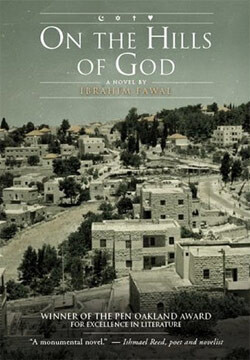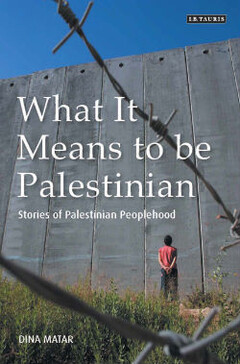The Electronic Intifada 23 July 2007

But despite its relevant timing, its impressive Pen Oakland award, and its tomelike 446 pages, Fawal’s book only barely manages to surmount its faults.
The story takes place in 1947-48, in the fictional village of Ardallah, literally “the land of God,” an everyvillage of sorts. Yousif is the idealistic, headstrong protagonist who spends all his time with his two best friends, Amin and Isaac. Christian, Muslim, and Jewish, they spend their days harassing tourists and dreaming about girls. But as the British Mandate comes to an end and the Zionist militias begin to gain ground, a dark future threatens to tear their idyllic world apart.
As we head full speed toward its 60th anniversary, this story has special resonance. Everyday, Gaza is squeezed a little tighter, the West Bank is broken into more pieces. The demands for civil rights by Palestinian citizens of Israel and for the Right of Return by the Palestinian Diaspora are drowned out by uninformed media pundits and a hypocritical “peace camp” dedicated to promoting the ghettos of the two-state solution. The rotten fruits of the nakba spread into Iraq, Lebanon, Syria and Iran. It is high time to bring the context back to the discussion, time for a book like On the Hills.
But the book falls short of its task. The great disappointment of On the Hills is the extent to which the author relies on the subject matter to carry the story. Were it about anything but the nakba, it would be just another book in an airport bookshop, sitting amidst other books authored by people who have made millions writing exactly like everyone else.
The story is full of characters who never distinguish themselves, who cling to the norm and never go off script. Yousif, Amin and Isaac are differentiated only by religion, class status, and body build, but never are their characters developed in much depth. There is also an element of tokenism in this treatment of the three boys that makes them unbelievable.
Yousif, the protagonist, is too transparently a puppet, the author’s own Wizard of Oz curtain to hide behind and speak through. At many points throughout the book, one wishes Fawal would drop the clause “Yousif thought” and just narrate.
The dialogue, like the characters, falls flat. There are rare moments of believable, natural exchange, but even the gems are too often clouded by the author’s unnecessary need to interject himself. For example, here are Yousif and Amin, chatting the day after Yousif witnesses a bombing:
“With my own eyes I saw a human arm stuck on a second-story balcony,” Yousif said. …That “Eww … cool!” moment is so classically seventeen-year-old boy that no matter what you think of the characters, this wins you over. You can almost see the glee on their faces beneath feigned seriousness. It’s the inappropriateness that humanizes the characters and makes you empathize with them. But Fawal can’t stay out of it, and cuts their conversation short with his own somber and forced conclusion that “They were all gripped by fear and wintry bleakness” (p. 117).“Whoever did it must’ve packed tons of TNT into those two barrels,” Amin said.
“It was awful,” Yousif agreed.
Fawal’s treatment of women is also questionable. Some of his descriptions could have come out of a Harlequin Romance. Here’s a typical example: “Yousif thought she was about two inches shorter than Salwa, but there was nothing small about her figure. She was ripe and rounded in all the right places” (p. 315-6). Were this an isolated example, or a narration of seventeen-year-old Yousif’s thoughts, one could chalk it up to character development. But throughout the book, women are consistently defined by the size of their chest, stomach and hips.
At certain points I almost put On the Hills down, feeling I was wasting my time reading mediocre literature.
But a strange thing happened: after carrying Fawal’s book around with me for a couple of weeks, it started to grow on me. In the way an NPR devotee still gets the beat of a Top 40 song stuck in her head despite herself, I became attached to the cookie-cutter characters, and started to follow the plot more carefully. By the end, I was hanging onto every word.
Why the change? Maybe because the book’s weakness is actually its strength. Because, and let’s give him the benefit of the doubt here, Fawal never intended On the Hills to be masterful writing. Perhaps bland, easy-to-read fiction is the spoonful of sugar that makes the bitter history of Palestine go down a little easier. And this could be the book that will deliver Palestine to the masses.
On the Hills is the perfect book to give to, say, your friend who hadn’t heard of Palestine before she met you and the first time you told her about your trip to the Middle East she thought you had gone to Pakistan. It’s a fast, easy read; the perfect melodrama for a summer trip to the beach.
Indeed, its very generic-ness is what gives the book room to deliver a few good punches. Its blow-by-blow account of the fall of Palestine keeps the history real in a visceral way that nonfiction can’t deliver. There are a couple of scenes that deliver up the humiliation of occupation so artfully that, reading them, I felt I was learning what it meant for the first time. The reader is guaranteed at least two good cries, and the ending is appealingly dark enough that Hollywood won’t be calling anytime soon.
If for subject matter alone, Fawal deserves to be read and distributed widely. But let’s hope that his nakba novel is only the first of many. Let us hope to be exhausted by the number of nakba fictionalization, each one building on the last. And as for Fawal, as the book drew to a close, it seemed to set the stage for the next in a series. Will we one day read the pop fiction, serialized history of Palestine 1948-present? That in itself would — almost — make up for the flaws of On the Hills of God, and any future works Fawal comes out with.
Lora Gordon has lived, worked and written from Gaza and Beirut. She now
lives in Chicago.
Related Links





